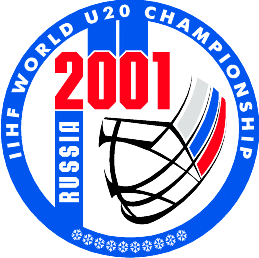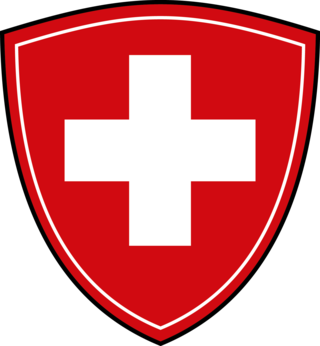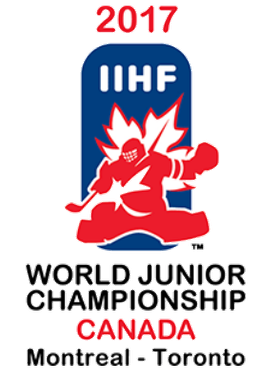
The Ice Hockey World Championships are an annual international men's ice hockey tournament organized by the International Ice Hockey Federation (IIHF). First officially held at the 1920 Summer Olympics. The IIHF was created in 1908 while the European Championships, the precursor to the World Championships, were first held in 1910. The tournament held at the 1920 Summer Olympics is recognized as the first Ice Hockey World Championship. From 1920 to 1968, the Olympic hockey tournament was also considered the World Championship for that year.

The IIHF Women's World Championship is the premier international women's tournament in ice hockey. It is governed by the International Ice Hockey Federation (IIHF).
The IIHF World Championship Division II are an annual sports event organized by the International Ice Hockey Federation. The division championships are played in two groups, part of the Ice Hockey World Championships

The 2001 IIHF World U20 Championship, commonly referred to as the 2001 World Junior Hockey Championships, was the 25th edition of the Ice Hockey World Junior Championship. The tournament was held in Moscow and Podolsk, Russia from 26 December 2000, to 5 January 2001. The Czech Republic won the gold medal for the second consecutive year with a 2–1 victory over Finland in the championship game, while Canada won the bronze medal with a 2–1 overtime victory over Sweden.

The 2010 World Junior Hockey Championships, was the 34th edition of Ice Hockey World Junior Championship. The tournament was hosted by Saskatoon and Regina, Saskatchewan, Canada, from December 26, 2009, to January 5, 2010. Saskatoon had hosted the tournament once before, in 1991. The medal round, as well as all Canada's preliminary round games, took place in Saskatoon at the Credit Union Centre. The arena underwent renovations and upgrades before the 2010 tournament, including an increase in capacity. Other games were played at the Brandt Centre in Regina, which also received upgrades. In addition, pre-tournament exhibition games were held in other towns and cities throughout the province as well as Calgary, Alberta. In the gold medal match, the United States defeated the pre-tournament favourites and host country Canada 6–5 in overtime on a goal by John Carlson to win their second gold medal and first since 2004, ending Canada's bid for a record-breaking sixth consecutive gold medal.

The 2009 IIHF World Women's Championships was held in Hämeenlinna, Finland, from 4 to 12 April 2009. This was the 12th women's ice hockey world championship run by the International Ice Hockey Federation (IIHF). The defending champions United States defeated Canada 4–1 in the final match to win the gold medal and retain their top standing another year.
The IIHF Inline Hockey World Championships were an annual international men's inline hockey tournament organized by the International Ice Hockey Federation (IIHF). The first World Championship was held in 1996 in which eleven nations participated. In 2003, sixteen nations took part and were split into two divisions. The top eight teams played for the World Championship and the other eight played for the Division I title. The last format in use featured the World Championship, Division I and three regional qualification tournaments. The World Championship and Division I tournament were played on odd years and the qualification tournaments were played on even years. The United States was the tournament's most dominant team, winning the World Championship seven times. After 20 editions, the IIHF cancelled the tournament in June 2019.

The Switzerland men's national under 20 ice hockey team is the national under-20 ice hockey team of Switzerland. The team is controlled by the Swiss Ice Hockey Federation, a member of the International Ice Hockey Federation.

The Norway women's national ice hockey team is the women's national ice hockey team in Norway. The team represents Norway at the International Ice Hockey Federation (IIHF)'sWorld Women's Championships and is controlled by Norges Ishockeyforbund. Women's ice hockey is growing in popularity in Norway and the number of Norwegian women's ice hockey players registered with the IIHF has increased from 482 in 2011 to 702 in 2019.

The Australian women's national ice hockey team represents Australia at the International Ice Hockey Federation's IIHF World Women's Championships. The women's national team is controlled by Ice Hockey Australia. As of 2011, Australia has 313 female players. Australia is ranked 30th out of 34 countries in the IIHF World Ranking. Kathy Berg took the team to its highest point, being ranked 20th. She was the longest serving coach. Richo Padjen took over and the team started slipping down the rankings and hadn't been able to recover its former glory. In September 2015, an announcement was made on the Ice Hockey Australia website that Canadian Lindsay McAlpine will be the new coach. Replacing Lee Brown. Lindsay McAlpine is expected to join the team for their first training camp in December.
The IIHF Asian Oceanic U18 Championship was an annual event held by the International Ice Hockey Federation (IIHF) each at the start of every year for national under-18 ice hockey teams from Asia and Oceania. The Championships first held in 1984 and was played every year until 2002 where the competition ceased as teams were integrated into the World U18 Championships.

The 2011 World Junior Ice Hockey Championship Division I was a pair of international ice hockey tournaments organized by the International Ice Hockey Federation. Six teams played in each of the two groups. In addition to the usual promotion and relegation, the format changed from two parallel tournaments, to two tiered tournaments. This means that the teams who finished 2nd and 3rd will be grouped together with the two relegated teams from the top division, and the teams who finished 4th and 5th will be grouped with the two promoted teams from Division II.

The Austrian national women's ice hockey team represents Austria at the International Ice Hockey Federation's IIHF World Women's Championships and is controlled by Österreichischer Eishockeyverband. Austria has 644 female players in 2011.

The 2013 IIHF World U20 Championship was the 37th edition of the Ice Hockey World Junior Championship (WJC). It was hosted in Ufa, Russia. It began on December 26, 2012, and ended with the gold medal game played on January 5, 2013. The United States defeated defending-champion Sweden 3–1 to win their third title, their first one since 2010. American goalie John Gibson was named MVP of the tournament.

The Thailand men's national under-18 ice hockey team is the men's national under-18 ice hockey team of Thailand. The team is controlled by the Ice Hockey Association of Thailand, a member of the International Ice Hockey Federation.
The 2003 IIHF World U18 Championship Division I was a pair of international under-18 ice hockey tournaments run by the International Ice Hockey Federation. The Division I tournaments made up the second level of competition at the 2003 IIHF World U18 Championships. The Group A tournament took place between 23 and 29 March 2003 in Ventspils, Latvia and the Group B tournament took place between 22 and 28 March 2003 in Briançon, France. Denmark and Norway won the Group A and Group B tournaments respectively and gained promotion to the Championship Division for the 2004 IIHF World U18 Championships. While Great Britain finished last in Group A and Ukraine last in Group B and were both relegated to Division II for 2004.
The 2004 IIHF World U18 Championship Division I was a pair of international under-18 ice hockey tournaments run by the International Ice Hockey Federation. The Division I tournaments made up the second level of competition at the 2004 IIHF World U18 Championships. The Group A tournament took place between 27 March and 2 April 2004 in Amstetten, Austria and the Group B tournament took place between 29 March and 4 April 2004 in Asiago, Italy. Switzerland and Germany won the Group A and Group B tournaments respectively and gained promotion to the Championship Division for the 2005 IIHF World U18 Championships. While Romania finished last in Group A and South Korea last in Group B and were both relegated to Division II for 2005.

The 2017 World Junior Ice Hockey Championships was the 41st edition of the Ice Hockey World Junior Championship. The main tournament was co-hosted by the Bell Centre in Montreal, Quebec and Air Canada Centre in Toronto, Ontario. This was the 14th championship that Canada had hosted. Montreal and Toronto also jointly hosted the 2015 edition. The tournament consisted of 30 games between 10 nations.

The 2016 IIHF Women's Challenge Cup of Asia Division I was an international women's ice hockey tournament run by the International Ice Hockey Federation. The tournament took place between 22 March and 26 March 2016 in Taipei, Taiwan and was the third edition held since its formation in 2013 under the IIHF Challenge Cup of Asia series of tournaments. Chinese Taipei won the tournament for the second year in a row after winning all four of their round robin games and finishing first in the standings. Thailand finished in second place and Singapore finished third.

The 2017 IIHF Inline Hockey World Championship was the 20th and final IIHF Inline Hockey World Championship, an international inline hockey tournament run by the International Ice Hockey Federation. The World Championship runs alongside the 2017 IIHF Inline Hockey World Championship Division I tournament and took place between 25 June and 1 July 2017 in Bratislava, Slovakia at the Ondrej Nepela Arena. The tournament was won by the United States, earning their seventh World Championship title. Finland finished in second place and the Czech Republic in third after defeating Sweden in the bronze medal match.














